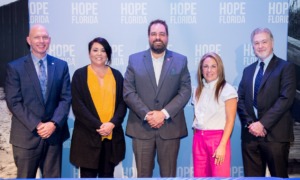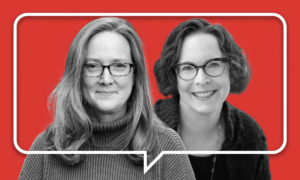On board at the D.C.-based affinity group of over 200 foundations funding children and youth undertakings is Marsha Renwanz, a well known figure in Washington’s youth field. She became executive director of Grantmakers for Children, Youth and Families in December, replacing Mary Bogle, a former HHS civil servant who held the job since the 16-year-old affinity group spun out of its early home at the Council of Foundations in 1995. While Renwanz’ career hasn’t circled the globe, it has circled the Mall. She spent 13 years on the Senate staff, including a tour as staff director for the then-Subcommittee on Children, Families, Drugs and Alcoholism chaired by Sen. Chris Dodd (D-Conn.). A three-year tour at the Office of Juvenile Justice under administrator Shay Bilchik ended in 1998. Since then, Renwanz has worked part time for the New York-based W.T. Grant Foundation and the Coalition of Hispanic Health and Human Service Organizations, where she recently authored “The State of Hispanic Girls.”
Interim Director Carol Hamilton remains on GCYF’s three-and-a-half-member staff. Its mission, says GCYF, “is to serve as a forum to discuss grantmaking strategies, exchange information about effective programs, examine public policy developments, and maintain dialogues with national leaders.”
The group’s 19-member board is chaired by Bob Long, a program officer responsible for a wide range of youth service grantmaking at the W.K. Kellogg Foundation. Christine Robinson, director of human development grantmaking at the D.C.-based Fannie Mae Foundation, is vice chair. Contact: (202) 393-6714.
A major shift in emphasis is well underway at the progressive Open Society Institute’s (OSI) Center on Crime, Communities and Culture. The New York-based Center, directed by Nancy Mahon since its founding in 1996, is part of a worldwide network of philanthropies’ funded by George Soros.
In 2000 (and in the foreseeable future) the Center will increasingly focus on those vital months in an offender’s life when he or she leaves prison. Each year about 500,000 of the nation’s 2 million adult prisoners are released. By three years later, 250,000 of them will again be locked-up. Of the $30 million that the Center has made in grants over the past five years, $14 million went to strengthening the re-entry weak link.
In March, Mahon left OSI to become executive director of God’s Love We Deliver, which serves AIDS patients throughout New York. Named as “co-acting director” are Helena Huang, formerly the associate director, and Susan Tucker, who recently joined OSI from the New York Victim’s Services agency.
As re-entry interests expand, the Center will cut back spending on preventing gun violence and promoting alternative sentencing. In 1999, the Center gave direct service youth grantees such as the LEAP in New Haven, Conn., and an alternative high school run by the Safer Foundation in Chicago what Mahon euphemistically calls “exit grants,” as the no-longer-to-be-funded groups cope with re-entry into the cruel world of CBO fund raising.
Contributing to the OSI slide in support for youth programs is an overall cutback in its national spending from $100 million in 1999 to $85 million this year. Contact: (212) 548-0135.






























